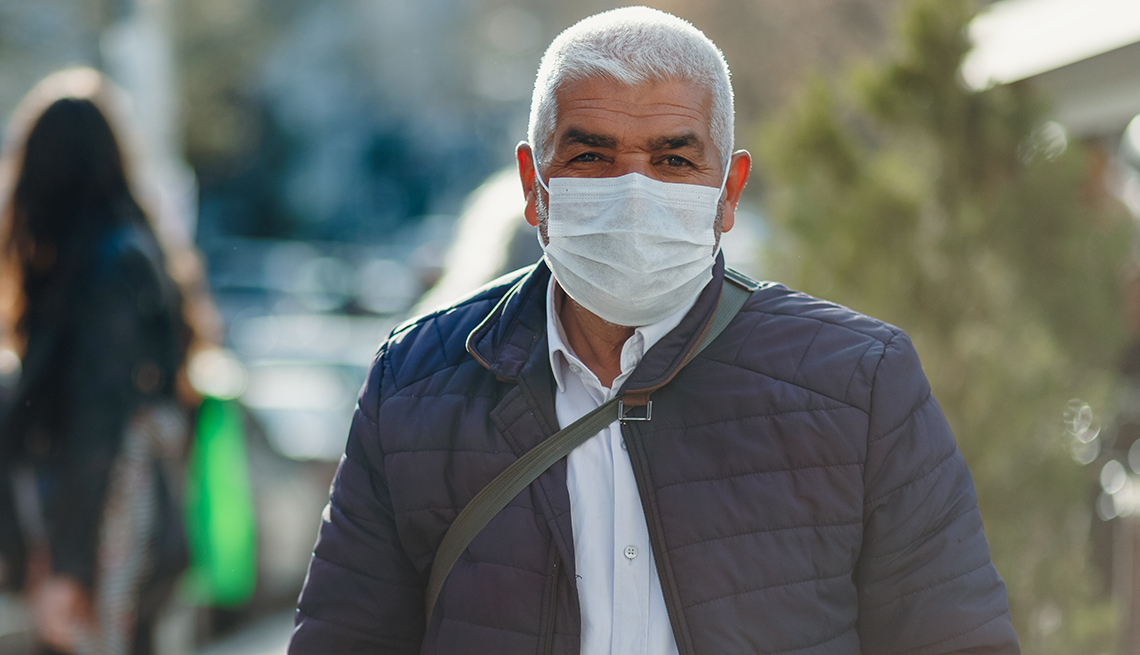The facts behind 7 common face mask misconceptions
The facts behind 7 common face mask misconceptions"
- Select a language for the TTS:
- UK English Female
- UK English Male
- US English Female
- US English Male
- Australian Female
- Australian Male
- Language selected: (auto detect) - EN
Play all audios:
MYTH 4: YOUR CLOTH FACE COVERING PROTECTS YOU FROM GETTING A CORONAVIRUS INFECTION. Cloth masks may reduce your risk of getting infected, but there haven't been enough studies on them
“in real-world settings” to know for sure whether they protect the wearer from becoming infected with the coronavirus, the National Academies of Sciences, Engineering, and Medicine (NASEM)
reports. What's more likely is that cloth face coverings help prevent an infected wearer from spreading disease to others by minimizing the dispersal of respiratory droplets via
talking, coughing and sneezing. (Studies looking at the effects of cloth face masks on influenza and other diseases also support this theory, NASEM points out.) Even with a face mask on,
it's important not to abandon other preventative measures, such as frequent handwashing and physical distancing, the CDC says. Mitigating the risk of COVID-19 (the illness caused by the
coronavirus) requires a multipronged approach, “which includes social distancing and isolation and hygiene and wearing the masks,” explains Gonzalo Bearman, M.D., an associate hospital
epidemiologist and chair of the Division of Infectious Diseases at the Virginia Commonwealth University School of Medicine. “It's not one or the other. It's all of it.” MYTH 5:
BABIES SHOULD WEAR FACE MASKS. Children under 2 should not wear a face mask, the CDC says. Neither should anyone who “has trouble breathing, or is unconscious, incapacitated or otherwise
unable to remove the mask without assistance.” MYTH 6: YOU SHOULD WEAR A FACE MASK EVEN WHEN YOU SWIM. If you plan to head to the pool or the beach this summer, don't forget to pack
your face mask. It will come in handy when you're out of the water and around others. That said, you should not wear your face mask in the pool. "The issue of getting a mask wet,
the issue of then breathing through that mask — it's a setup for danger,” says Boris Lushniak, M.D., dean of the University of Maryland School of Public Health and former acting and
deputy U.S. surgeon general. When you're in the water, the best way to reduce your risk of spreading or acquiring the virus is to keep a distance of at least 6 feet from other people
and to wash your hands often when you're done swimming. MYTH 7: YOUR FACE MASK DOESN'T NEED TO BE WASHED. Masks collect germs, so it's important to wash them after each use,
the CDC advises. If you're using a washing machine, regular laundry detergent and warm water work just fine. To wash your mask by hand, mix up a solution of bleach and water (4
teaspoons of household bleach per 1 quart of room-temperature water) and soak your mask for 5 minutes before rinsing it with cool or room-temperature water. The CDC has detailed instructions
on how to wash your face mask.
Trending News
Horror outside pub as reveller drives at group - pinning one woman to wallA coked-up reveller repeatedly drove his car at people outside a Middlesbrough pub - pinning one woman to a wall and kno...
North yorkshire seaside town cul-de-sac evacuated after deaths of two menResidents of a seaside town in North Yorkshire have been evacuated and a police cordon is in place as authorities invest...
Middlesbrough's Hayden Hackney outperforms Europe's best making transfer interest inevitable - Teesside LiveSportMiddlesbrough's Hayden Hackney outperforms Europe's best making transfer interest inevitableHayden Hackney is attra...
Frankland Prison inmates and staff exposed to 'Spice fumes' requiring hospital checks - Teesside LiveNewsFrankland Prison inmates and staff exposed to 'Spice fumes' requiring hospital checksHMP Frankland has been deemed a...
Trainer jeff retires after inspiring hundreds in over 6,000 bootcampsTrainer Jeff has retired after inspiring hundreds of Teessiders in over 6,000 military-style bootcamps during his 14-yea...
Latests News
The facts behind 7 common face mask misconceptionsMYTH 4: YOUR CLOTH FACE COVERING PROTECTS YOU FROM GETTING A CORONAVIRUS INFECTION. Cloth masks may reduce your risk of ...
Page Not FoundPage Not Found The content that you're looking for is unavailable. You might find what you are looking for by using the ...
Expert on how kate displays 'more power' in public than prince williamHe then explained: “The other option is what Catherine does; she just takes a quick look at the person’s hand or in some...
The Voting Rights Act at 50* Getty Images HALF A CENTURY En español l The Voting Rights Act, signed into law at the height of the civil rights move...
Page Not Found.Page Not Found. Hopefully you will find what you are looking for here....
